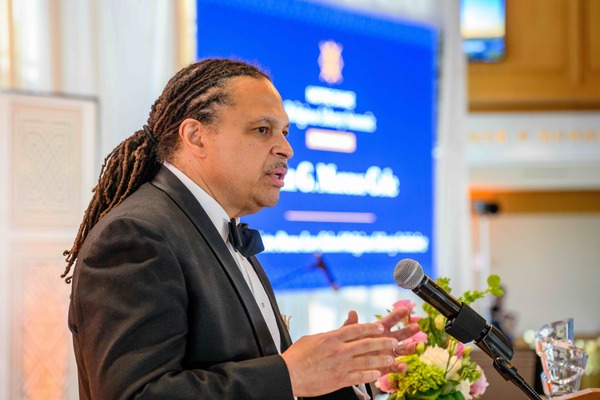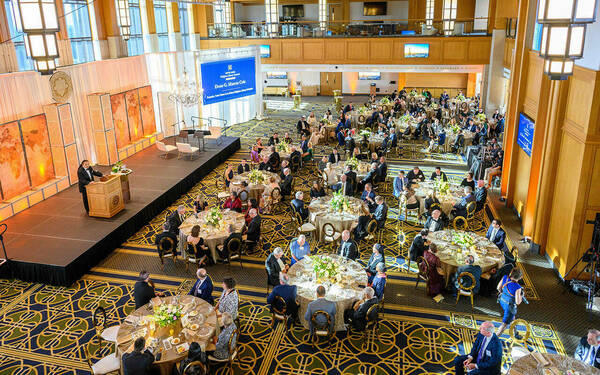2024 Notre Dame Religious Liberty Summit: Dean G. Marcus Cole’s remarks at Gala & Award Dinner

Good evening, I am Marcus Cole, Dean of Notre Dame Law School, and I want to welcome you to the fourth annual Notre Dame Religious Liberty Summit Gala Dinner, highlighted by the award of the 2024 Notre Dame Prize for Religious Liberty to Professor Nazila Ghanea.
I am grateful to God for this gathering tonight. I give thanks for the University of Notre Dame, its President, Rev. Robert A. Dowd C.S.C., and our Provost John McGreevy, their support of the Notre Dame Religious Liberty Initiative. I am deeply grateful to all of our donors, especially Lindsay and Matt Moroun, about whom I will say more later, for helping to make us a real force for religious freedom. I am grateful for Professor Stephanie Barclay, for believing in my vision, and taking a leap of faith that together, we could build a truly unique institution.
Professor John Meiser has built our clinic into one that has gained the attention and respect of the courts and advocates around the country.
I am also grateful to our lawyers: Meredith Holland Kessler, Brendan Wilson (who runs our Transactional Clinic for Religious Entities), Brett Cavanaugh, Kimberlie Orr, and Francesca Matozzo. Those of you here will have also seen other members of our team, including Mia Tiwana, Laura Sniadecki, Denise Wager, Arienne Calingo, Lisa Driver, Tonya Robinson, and Adrianna Galicia. Please join me in giving them a round of applause.

The purpose of the Notre Dame Religious Liberty Summit is to facilitate the exchange of ideas, discuss issues, and develop strategies to advance the fight for religious freedom in the United States and around the world. This Summit and these conversations are central to our mission, which is to promote human flourishing by serving as a source of advocacy, counsel, scholarship, training, fellowship, and hope in defense of the fundamental human right to the freedom of religion or belief for all people.
And while I have found all of the conversations stimulating, I was struck by something someone said yesterday, namely, that people of faith are talking past the rest of society when we talk about religious freedom. In an increasingly secular society, talk about religious freedom isn’t just a foreign language, it is scary, threatening language.
Over the last few years, the defenders of religious freedom have won tremendous victories in courts of law. They were hard-fought, and some of them represent decades of hard work, by people in this room.
But as I said last year, those legal victories are not enough. They will be fleeting if we only win in the courts of law. To preserve those victories, we must also win in the court of public opinion.
We have won victories of the mind. We also need to win the victory of the heart.
So how do we do this?
I think about this question a lot. Those of you who have heard me before, know that Angie and I say a prayer with our kids every morning before we send them out into the world. My wife Angie often tells our two sons that “it is very important to believe in miracles, and that it is very important that we pray for miracles. But sometimes God wants us to be a miracle for someone else. Angie would tell our boys, “Be someone’s miracle today.”
Let me tell you about someone I met recently who lives his life this way.
In addition to all of the construction you see currently on this campus, we are doing some significant renovations to the Law School. Towards this end, I had the task of picking out and purchasing a large quantity of furniture for the Law School commons area. As I reviewed the choices, there was one company whose products stood out above all of the rest. The furniture, made of wood and iron for heavy use commercial settings, was some of the finest craftsmanship I have ever seen. It was also competitive on price.
So I looked into the manufacturer, and visited their factory down on the east side of Indianapolis.
The company was founded by a businessman and investor named David Palmer. He lived in the very affluent suburb of Carmel, Indiana. As a Christian, he felt compelled to do service in the inner city, so he volunteered serving lunches at a homeless shelter downtown. When he asked the men there what they really wanted, each man would invariably respond that he wanted a job.
As an amateur woodworker himself, David Palmer thought that anyone could be taught to work with wood. So he decided to start a non-profit wood furniture company called “Purposeful Design.”
Over its twelve years of existence, Purposeful Design has outfitted and supplied furniture to some of the largest office complexes and buildings in Indianapolis, then Indiana, and today, all across the country, including in this room here at Notre Dame Stadium. But if you ask David Palmer, he is not building furniture; he is building men.
In its twelve years of existence, Purposeful Design has helped over 300 men leave homelessness, drug addiction, and prison, on the way to a better life. Although they work building furniture, they also have dedicated Bible study and prayer time. Many of the men have used their earnings to buy their first homes. They did this in an area near the factory, in the most rundown, crime infested neighborhood in Indianapolis, known as “the Swamp.” Soon the swamp had playgrounds built by the men of Purposeful Design, and the crime left as those same men formed a neighborhood watch group. Soon schools, and grocery stores followed.
And so did David Palmer.
David Palmer left his large, luxurious home in Carmel, and moved his family into a house in the Swamp.
If you ask David Palmer why he did all of this, he will tell you that he felt called by God to use his abilities to be of service to those in need.
David Palmer doesn’t just believe; he lives his belief.
David Palmer is an example of what is missing from our narrative about freedom of religion. We need to emphasize the good that religion can bring. In my own Christian religious tradition, it expressed in the First Letter of the Apostle Paul to the Corinthians, Chapter 13. There, St. Paul recounts the gifts of the Holy Spirit of faith, hope, and love. But he goes on to say:
If I speak in the tongues[a] of men or of angels, but do not have love, I am only a noisy gong or cymbal. 2 If I have the gift of prophecy and can understand all mysteries and all knowledge, and if I have a faith that can move mountains, but do not have love, I am nothing. 3
If we are to win the case for religious freedom, we must prove to the secular world that the world is a better place with freedom of religion or belief, even if they do not believe. We must win this case in the court of public opinion, and that courtroom is in each heart. We cannot win hearts with reason; we must win hearts with love.
Don’t get me wrong; law is important. But for America, and the world, we must restore faith in faith.
While we are fighting the battles over the separation of church and state, we must win the battle for separation of church and hate.
We will win both battles with our most powerful weapon – love.
As my friend Louis Brown once said to me, “faith is love in action.” As we read in James 2:26, “faith without works is dead.”
Religious freedom has produced a lot of love.
In the United States, the single largest provider of healthcare is the Catholic Church.
The Catholic Church is also the largest provider of education in the United States. The numbers are multiplied by orders of magnitude all around the world, especially in the poorest communities of the world.
When someone once asked James Cardinal Hickey, the late Archbishop of Washington, why he maintained Catholic schools in the poorest Black neighborhoods of Washington, when few if any of the children were Catholic, he responded “we don’t educate them because they are Catholic; we educate them because we are Catholic.
And we Catholics are not alone.
Each year, the Church of Jesus Christ of Latter-Day Saints gives away more than one billion dollars in 190 countries.
Other faith traditions do the same. There are over one thousand registered Muslim charities that provide relief to the poor. Jewish charities like Mazon and the American Jewish World Service fight hunger, while the Hebrew Immigrant Aid Society has helped refugees the world over, from Vietnam to Mexico to Syria and Ukraine.
These actions are not compelled by law or paid for with taxes. This work is an expression of faith rooted in love.
Religion is good for the world. But it can only be good for the world if we are free, not only to believe, but to actually live our beliefs.
Religious freedom allows us the freedom to show others that we love them. And so we should.
At the end of the day, legal victories in court are not enough. In a politically polarized world, these legal victories will last only as long as people believe that religion is a good thing.
Fifty years ago, my predecessor, the seventh Dean of Notre Dame Law School, Thomas Schaefer, used to tell his students a story about a monk in the Middle Ages who traveled to see the building of the Cathedral at Chartres.
As the monk arrived at the cathedral, he met a man cutting stone. He asked the man what he was doing, and the man replied, “I am a stone mason, and I am cutting stones.”
He later encountered a second man, cutting wood. He asked the second man what he was doing, and the second man said, “I am a carpenter, and I am making a wooden beam.”
Finally, he encountered a woman sweeping the floor with a broom, cleaning up the dust from the construction. When he asked the woman what she was doing, she said “I am building a cathedral to the greater glory of God.”
Each of us engaged in this fight must realize the bigger picture; every small effort we make contributes to the larger cause.
That is what David Palmer is doing. He is not just building wood furniture. He is not just building men. He is building a cathedral to the greater glory of God.
And that is what we are doing. Christ commanded us in Matthew 28:19 to “go and make disciples of all nations.” How can we succeed in this mission if people are not free to believe?
When we defend and promote religious liberty, we are not merely protecting our most fundamental freedom. We are building a cathedral to the greater glory of God.
Thank you.